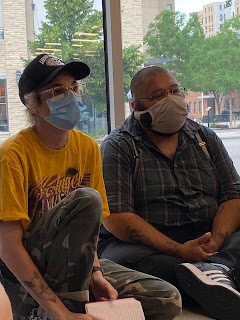I am about to start my Fall semester. As I plan my interactions with my students, I am challenging myself to examine the practices we used in Art TEAMS this summer and see which of those would fit into my class. The first that sprang into my mind as I was planning the details of the work tomorrow was the use of active listening. In the picture to the right are two of our teaching artists from the summer, Caileen, and Fernando. While they both brought expertise, they also spent a significant amount of time listening. At the end of the second week, Fernando shared a powerful spoken word poem that showed how much he listened. His poem described his understanding of the teacher experience. His poem showed how powerful listening can be in understanding your fellow humans. Hence, in my class this semester I aim to enhance democratic practices with the practice of careful listening. Starting tomorrow, we will take time to make sure that we all learn to provide some space for each other to express ourselves without interruption.
Individual listening is an addition to the practice of opening circle in which everyone listens ad everyone speaks (in turn).
If many quote "Be the change you want to see in the worlds" - yes I know there are multiple versions of this sentence and an argument about who originated it. For teacher educators, however, it is also "Model the change you want to see in the world".
It is a new semester, another opportunity to practice and model what we preach.








.jpeg)